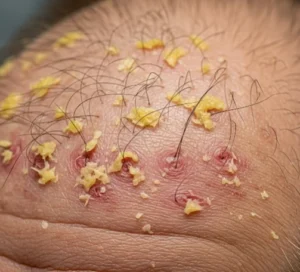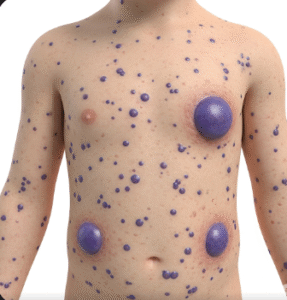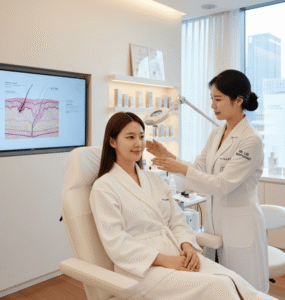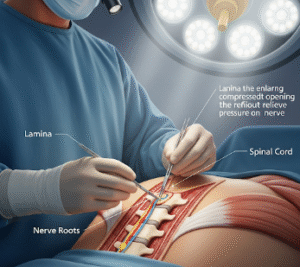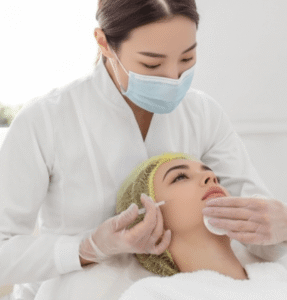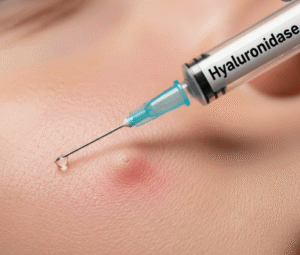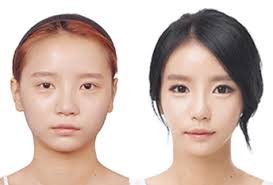➤ Overview
A scalloped tongue, also known as a crenated tongue, is a condition where the edges of the tongue develop wavy, indented, or rippled patterns that resemble teeth marks. This happens when the tongue repeatedly presses against the teeth, either due to tongue enlargement, teeth misalignment, or habits such as teeth grinding. While the condition itself is usually painless, it can indicate underlying health concerns such as sleep apnea, hypothyroidism, nutritional deficiencies, or temporomandibular joint (TMJ) disorders.
In South Korea, healthcare providers often treat scalloped tongue not just as an oral issue but as a potential sign of systemic health problems. Doctors typically perform comprehensive examinations, including dental checks, thyroid tests, and sleep studies, to determine the root cause.
➤ Key Facts
→ Scalloped tongue is also called crenated tongue.
→ It often occurs due to tongue pressing against teeth.
→ Can be associated with macroglossia (enlarged tongue).
→ May indicate bruxism (teeth grinding) or sleep apnea.
→ Usually not a disease itself, but a symptom of other conditions.
→ Treatment focuses on addressing the underlying cause, not just the tongue.
→ In Korea, diagnosis may involve oral exams, blood tests, sleep studies, and dental evaluations.
➤ What is Scalloped Tongue?
Scalloped tongue is characterized by indentations along the tongue edges, often caused by the tongue pressing against surrounding teeth. The appearance can range from mild ripples to deep indentations.
Though usually harmless, a scalloped tongue can indicate hidden health problems. Many people discover it during routine dental exams. Korean doctors treat it as a clinical sign, not a disease, and often investigate systemic causes such as thyroid disorders, nutrient deficiencies, or sleep-related issues.
➤ What Symptoms are Related to Scalloped Tongue?
Scalloped tongue may occur alongside other symptoms:
→ Tongue swelling (macroglossia).
→ Dry mouth (xerostomia) or persistent thirst.
→ Mild discomfort or soreness while speaking or eating.
→ Snoring, poor sleep, or daytime fatigue (linked to sleep apnea).
→ Jaw pain, teeth wear, or headaches (due to bruxism).
→ Hair loss, brittle nails, or weight changes (possible thyroid issues).
→ Signs of nutritional deficiencies, like pale skin or weakness.
➤ What Causes / Possible Causes?
The causes of scalloped tongue vary and often relate to oral habits or systemic health:
→ Macroglossia – Enlarged tongue pushes against teeth.
→ Bruxism (teeth grinding) – Repeated pressure leaves indentations.
→ Obstructive Sleep Apnea (OSA) – Enlarged tongue and airway blockage during sleep.
→ Hypothyroidism – Low thyroid hormone causes tissue swelling, including the tongue.
→ Nutritional Deficiencies – Lack of iron, vitamin B12, or folate affects tongue health.
→ Dehydration / Dry Mouth – Less saliva increases tongue pressure.
→ Dental Misalignment – Irregular teeth create uneven impressions.
→ Stress / Anxiety – Heightens risk of bruxism and tongue pressure.
➤ When Should I See My Doctor?
Medical attention is advised if scalloped tongue is persistent or accompanied by other symptoms:
→ Persistent swelling or pain in the tongue.
→ Changes in tongue color, coating, or texture.
→ Additional symptoms like fatigue, hair loss, or weight gain.
→ Snoring, breathing pauses, or daytime sleepiness.
→ Jaw pain, frequent headaches, or worn teeth.
→ Dry mouth or bad breath despite good oral hygiene.
➤ Care and Treatment
Treatment focuses on the root cause rather than only the tongue appearance:
→ Hydration – Drink sufficient water to reduce tongue swelling.
→ Nutritional support – Supplements for iron, B12, or folate deficiencies.
→ Mouth guards or splints – Protect teeth and tongue in bruxism.
→ Oral hygiene – Regular brushing, flossing, and tongue cleaning.
→ Lifestyle modifications – Stress reduction, sleep improvement, avoiding smoking or alcohol.
→ Medical treatment – Address thyroid or metabolic disorders if present.
➤ Treatment Options in Korea
South Korea is recognized for its integrated oral and systemic healthcare, making it an ideal place to manage scalloped tongue:
Diagnosis in Korea
→ Oral exams by dentists and ENT specialists.
→ Sleep studies to detect obstructive sleep apnea.
→ Thyroid function tests to diagnose hypothyroidism.
→ Blood tests for nutritional deficiencies.
Medical Treatments in Korea
→ Prescription of thyroid medications if hypothyroidism is detected.
→ Nutritional therapy and dietary guidance for deficiencies.
→ CPAP devices or airway therapies for sleep apnea.
Dental & Advanced Therapies in Korea
→ Custom night guards to prevent damage from bruxism.
→ Orthodontic treatments for misaligned teeth.
→ Rare cases: tongue reduction surgery for severe macroglossia.
Rehabilitation & Support in Korea
→ Lifestyle counseling on diet, stress, and sleep habits.
→ Combination of Western medicine with Korean traditional therapies, such as acupuncture, for jaw tension and bruxism relief.




